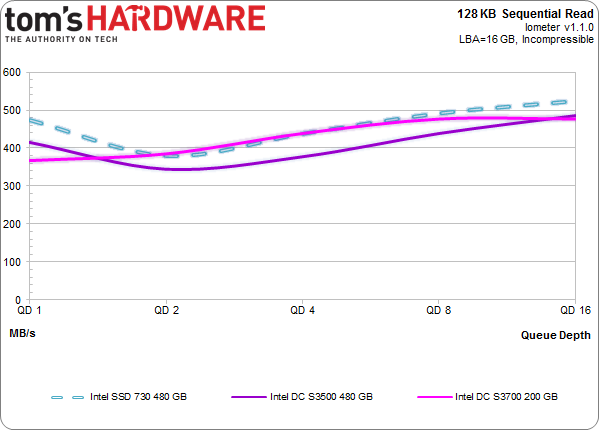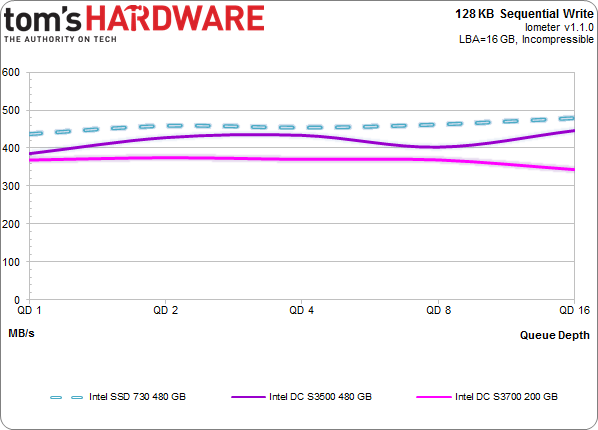The SSD 730 Series Review: Intel Is Back With Its Own Controller
Results: 128 KB Sequential Performance
Fantastic sequential read and write performance is a trademark of modern SSDs. To measure it, we use incompressible data over a 16 GB LBA space, and then test at queue depths from one to 16. We're reporting these numbers in binary (where 1 KB equals 1024) instead of decimal numbers (where 1 KB is 1000 bytes). When necessary, we're also limiting the scale of the chart to enhance readability.
128 KB Sequential Read
So long as we're limited by interface performance, there's not going to much interesting to see in an analysis of 128 KB sequential reads. It's fairly easy for each of these SSDs to serve up big numbers. The SSD 730 Series 480 GB edges out Intel's more enterprise-oriented drives, peaking in excess of 525 MB/s. And these are binary numbers, not decimal. If we switched up the units, we'd be reporting results closer to 560 MB/s.
128 KB Sequential Write
The SSD 730 Series beats the architecturally-similar SSD DC S3500 by a small margin, achieving almost 480 MB/s.
Granted, that's at higher queue depths. In the strictest sense, sequential accesses at high queue depths aren't really sequential. The operating system and drive see multiple threads performing sequential activity as random; consecutive requests are to logical block addresses more than one LBA away.
Here's a break-down of the maximum observed 128 KB sequential read and write performance with Iometer:
Get Tom's Hardware's best news and in-depth reviews, straight to your inbox.
Intel eschews the fancy emulated SLC schemes employed by Samsung, SanDisk, and OCZ in favor of brute strength (lots of dies, a powerful controller, and fast flash). As you can see, Intel drives armed with the company's own controller fare better than a lot of the competition, particularly when it comes to writes. The SSD 730 Series goes up against the fastest client-oriented drives out there, while its more enterprise-class SSD DC S3x00 models fall to mid-pack.
Current page: Results: 128 KB Sequential Performance
Prev Page Test Setup And Benchmarks Next Page Results: 4 KB Random Performance-
blackmagnum That skull on an Intel SSD means this product is the Big Kahuna. Samsung just cannot crush this competition.Reply -
Amdlova that 480 drain more than a 5400rpm HDD. Samsung or sandisk for laptops. Please next SSDReply -
rokit Never expected Intel to fail like that. Samsung still offers the best performance/power consumption/$Reply
I guess that skull did the job, power of signs )
p.s. this site has level editing in non-forum mode(the one you see and use by default)
Watch the language. - G -
mamasan2000 I don't see why the Intel SSD is any good. It's midpack at best at everything. Even my cheap Sandisk is better and it was the cheapest SSD I could get around here (besides Kingston).Reply -
unityole how is samsung the best? http://www.tweaktown.com/blogs/Chris_Ramseyer/58/real-world-ssd-performance-why-time-matters-when-testing/index.htmlsandisk and toshiba SSD, look at the chart and see the performance for yourself. Evo doing well, but thats only cause of the SLC flash helping it.Reply -
eriko All this Samsung love here... I have two brand new 840 Evo 250GB drives, and they are garbage.In fact they are so poor, I had to separate all my files, and break the RAID,and have two individual volumes, so as to have Trim enabled, and also Magician running, otherwise, terrible read and write (especially) performance resulted. I did verify they were genuine drives too. As soon as you begin to fill up these 250GB Evos, performance falls off a cliff.I'm now not a believer in TLC, and wish I had waited to get the Pro's (not available in this part of the world), as I hear much better things about them.But I've had my fill of reading reviews on consumer drives, I'm going to California in a week or so, and so I will either get 2 x 400GB S3700's, or a single 800GB S3700 (and to hell with RAID). Enterprise drives are the bomb, and don't forget that. Lost way too much time and data now with 'consumer' drives...By the way, X25E 64GB still going strong without so much as a hiccup. Not even a burp... If they made a 640GB X25E, I think I'd suck their, ok, I won't say that but you get the idea.Reply -
zzzaac Just curious, this speed, would you be able to tell that it is faster, or is it just though benchmarks?.This ssd is quite expensive at my local parts shopReply


